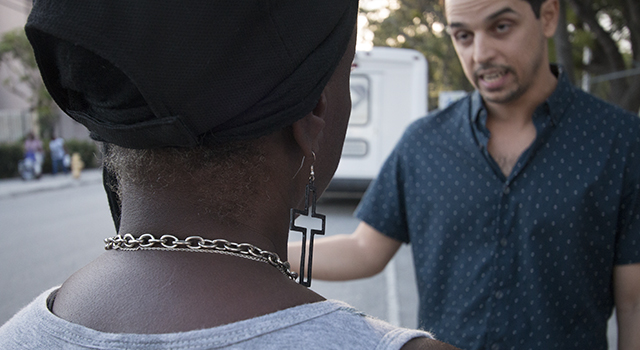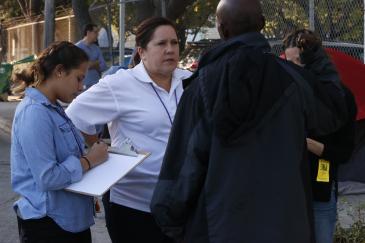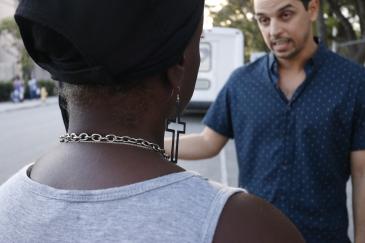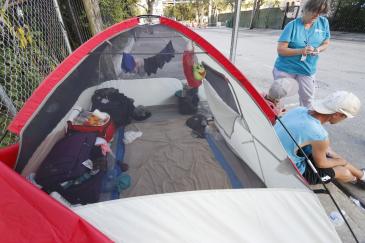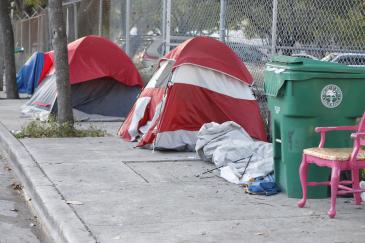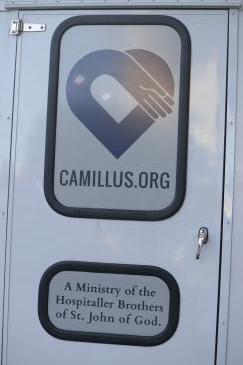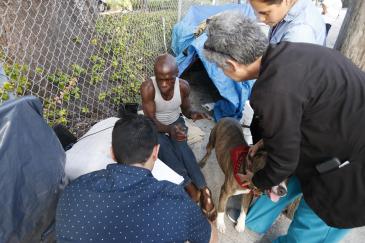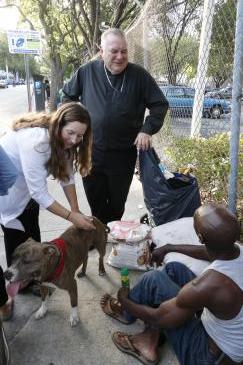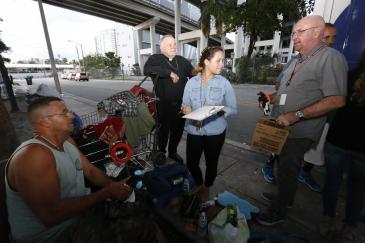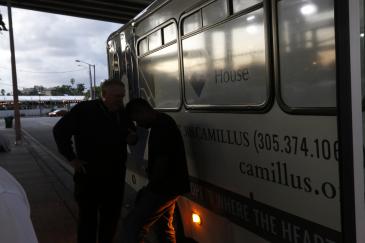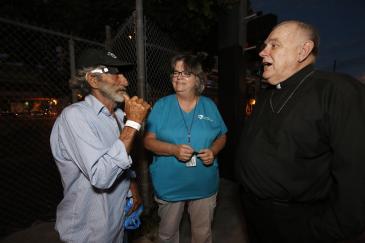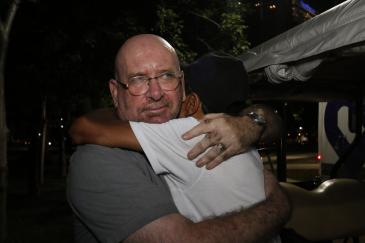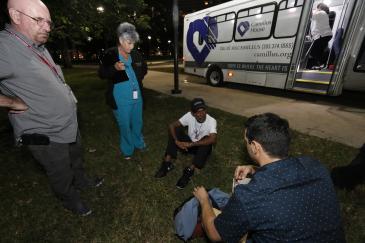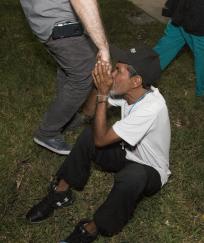By Ana Rodriguez Soto - The Archdiocese of Miami
Photography: ANA RODRIGUEZ-SOTO | FC
MIAMI | Rosman Justilien lives on the streets, with his dog, Bobo, at his side. Justilien keeps him on a leash he fashioned out of a discarded electrical cord.
The team from Camillus House found them both sitting next to their blue-tarp home, on the sidewalk across from the Missionaries of Charity shelter near Jackson Memorial Hospital. Camillus House itself is less than a block away: its showers, its meals, its health care, its subsidized housing and treatment centers.
But it’s a block too far for Justilien, who suffers from mental illness. He’s one of an estimated 1,000 or so homeless people who live on the streets of Miami-Dade County, a high percentage of whom � estimates range from 30 to 60 percent � are chronically homeless due to severe mental illness.
Because Justilien is too ill to seek help, the team from Camillus House’s Lazarus Project reaches out to him. They found him on their weekly night outing Nov. 22, the day before Thanksgiving.
He had hurt his hand and it was swollen, probably infected. He didn’t like to take his medication, he said, because it made him feel bad. He didn’t want to go to a shelter because he would have to part with his dog.
“That’s not a problem. We have a kennel,” said Hilda Fernandez, CEO of Camillus House.
Fernandez was not the only VIP who roamed the streets with the Lazarus team that night. Archbishop Thomas Wenski also joined them, to highlight the first World Day of the Poor announced by Pope Francis, and marked Nov. 19.
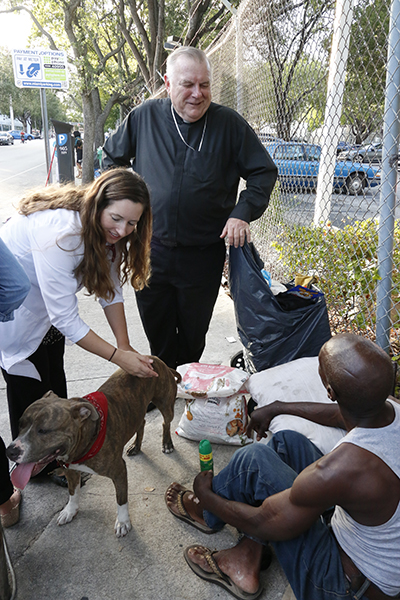
Photographer: ANA RODRIGUEZ-SOTO | FC
Archbishop Thomas Wenski chats with Rosman Justilien, who lives on the street with his dog, Bobo. At left is Lazarus Project physician Sara Iobst. Archbishop Thomas Wenski visited Miami's homeless Nov. 22, the night before Thanksgiving, to mark the first World Day of the Poor. He walked alongside Lazarus Project workers from Camillus House.
It was a fitting outing to those in the peripheries, those literally and figuratively discarded by society. One homeless man even asked the archbishop to hear his confession.
“They have a cohort of people they case-manage on the streets,” said Fernandez, describing the work of the Lazarus team, which consists of physicians, psychiatric nurse practitioners, and case managers from Camillus House and Camillus Health as well as City of Miami outreach workers.
Gentle invites
Teams go out every morning, seven days a week, literally making rounds on the streets to ensure the chronically mentally ill take their medication. They give them their pills. Chat with them. Take their blood pressure. Hand out socks and insect repellent.
They gently invite them to take a shower at Camillus House. Get a meal there. Or make an appointment for a flu shot or proper wound care at Camillus Health. Camillus House can provide them with an ID or help them retrieve lost documents, such as Social Security cards.
Lazarus team members don’t pressure the homeless. They build up relationships, and trust.
Once a week, they go out at night because “you can’t find everyone in the morning,” said Rose Anderson, a psychiatric nurse practitioner with Camillus Health.
“Eventually our real goal is to get them into housing. But there’s a lot of hurdles that you can’t get through by yourself, especially if you’re schizophrenic,” she said. “Most of them are going to be in permanent supportive housing for the rest of their lives.”
The hard part is stabilizing them: getting them to take their medication regularly, so that they stay out of jail or Jackson’s mental health crisis center.
“If you don’t do that intervention on the streets, they’re not going to come in on their own,” Anderson said. She noted that many of them have been “cycling through hospitals, psychiatric centers, county jails, and emergency rooms for years, at a high financial cost to the community.”
Getting them into supportive permanent housing, she added, is not just the “Christian, humane thing to do, it also is smart,” because it reduces the costs to the community.
‘Resurrecting people’
Project Lazarus is named after a City of Miami outreach worker, Lazaro Trueba, who started the project in October 2014.
“But I think it’s very fitting in terms of resurrecting these people,” said Fernandez, who took over as CEO of Camillus House in March of this year.
Camillus is part of the continuum of care for the homeless in Miami-Dade County. It works with the Homeless Trust and other agencies to get the homeless into emergency shelters, transitional or permanent housing. Fernandez directed the Homeless Trust for two years. Before going to Camillus House, she served as head of advancement and communication at the archdiocesan-owned St. Thomas University.
The most recent count, taken in January 2017, showed 3,847 homeless in Miami-Dade County, of which 2,836 were sheltered and 1,011 unsheltered. It’s those unsheltered with severe mental illness the Lazarus Project is trying to reach.
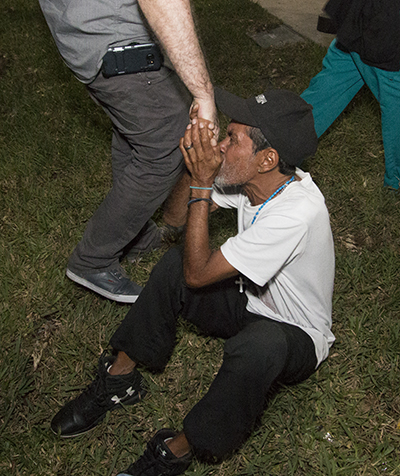
Photographer: ANA RODRIGUEZ-SOTO | FC
Tony Ortiz, who is back on the streets after getting off them once before thanks to outreach and housing programs offered by Camillus House, kisses the hand of Hospitaller Brother Richard Moore.
And even once they’re handed off to places like Camillus House, “we follow them as long as we need to,” said Anderson. Since the project began, the team has been successful in housing over 150 people, she added.
But it takes time and patience; sometimes as long as a year of constant visits. And sometimes, people relapse. They stop taking their medication or fall back into addiction.
After several hours on the streets that night, the Lazarus team went looking for Tony. Tony Ortiz had come in from the streets a while back. He had gotten a job. Found an apartment where he lived with a friend who had also gotten off the streets. Then his friend died. He relapsed into addiction. Lost his job. Lost the apartment.
After a few minutes, Ortiz came over. With tears in his eyes, he hugged Hospitaller Brother Richard Moore, a case manager with the Lazarus Project.
The Brothers of the Good Shepherd, who founded Camillus House in 1960, merged with the Hospitaller Order of St. John of God in 2015. The Hospitallers, whose order dates back to the 16th century, dedicate themselves to working with the poor and the sick.
Ortiz held onto Brother Richard’s hand as Edward Suarez, director of the Lazarus Project, offered him socks and insect repellent.
“We’re going to help you,” Suarez told Ortiz. “We’re going to get you out of this dark hole.”
Standing nearby, case manager Alina Wetzstein also assured him. “You did it before. You can do it again.”
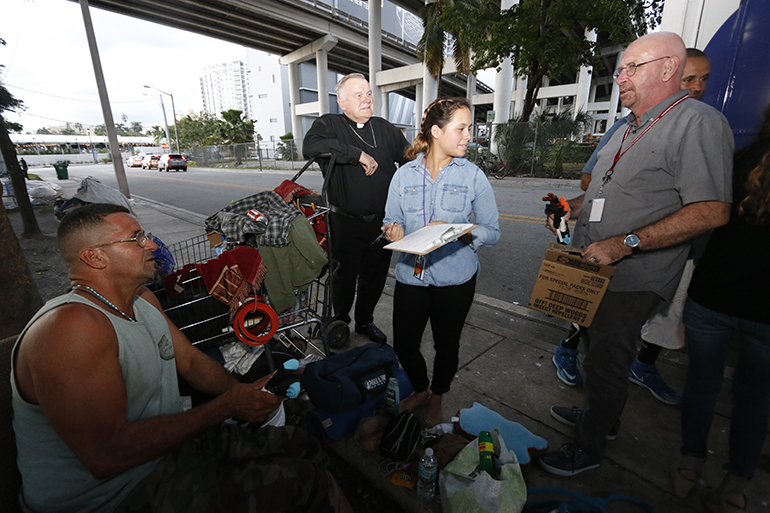
Photographer: ANA RODRIGUEZ-SOTO | FC
Roberto Zuñet, seated, speaks with Hospitaller Brother Richard Moore as Lazarus Project intern Gabriela Puig and Archbishop Thomas Wenski stand by.
Corrections/clarifications: The original version of this article conflated Project Unleashed with the onsite kennel at Camillus House. Project Unleashed is a non-profit made up of veterinarians who visit Camillus House once a month to help care for clients' pets. The article also has been amended to note that the Lazarus Project reaches out a subset of the 1,000 or so chronically homeless in Miami-Dade County: those with severe mental illness.
